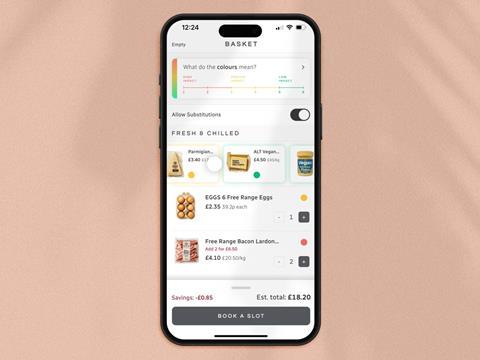
Special Projects has revealed five solutions in an effort to help consumers make environmentally conscious decisions during their food shops, including eco-label designs, digital interactivity with physical menus, and in-app breakdowns of a product’s sustainability metrics.
The food sector is responsible for around 30% of greenhouse gas emissions worldwide, according to the Food and Agriculture Organisation of the United Nations (FAO). In response, Special Projects undertook the Eco Lenses project, in which it worked to develop physical and digital touchpoints to bring ‘convenience’ and ‘seamless experiences’ to café, restaurant, fast food, takeaway, and online grocery shopping scenarios.
In the first scenario, the company partnered with the University of Bristol’s School of Experimental Psychology to examine the impact of labels displaying sustainability credentials on consumer behaviour. Four cafés across the university campus participated in the study in October 2023.
Special Projects designed new ‘eco-labels’ for three of the most popular sandwiches sold at the cafés. They utilized the ‘universally recognizable’ traffic light colour system to indicate low, medium, and high environmental impact in terms of water usage, biodiversity loss, and greenhouse gas emissions.
These designs were expected to communicate sustainability claims from a distance, while the implementation of a gradient system ‘provided a gentle influence on behaviours’ and avoided ‘intimidating’ warning symbols, ‘guilt-inducing’ messaging, and sustainability jargon. Apparently, this approach resulted in a 55% positive impact on consumer decision-making and raised awareness.
Further trials are scheduled for spring 2024.
A similar solution has been devised for online shopping. Each item placed in a consumer’s digital shopping basket would display a red, yellow, or green sustainability score to indicate their environmental impact; the shopper can then tap the score of each item to view alternative options, or they can swipe right towards the green end of the scale to view the highest-ranked options on offer.
Alternatively, Special Projects suggests that AI can gauge which meals a consumer plans to make based on the food in their basket. From there, it can suggest similar yet more sustainability-minded alternatives, and consumers can swap their foods a single tap to improve the sustainability score of their shop.
The company adds that, in the wake of the cost-of-living crisis, a similar solution could be devised to recommend cost-effective products to consumers.
Another project noted the reported 55% increase in food delivery app usage since 2015 and aspired to drive sustainability and healthy eating when ordering fast food. Special Project has implemented an additional feature that displays an overarching sustainability score when consumers click on an item, indicating a meal’s environmental impact.
With another tap, the food item is broken down into its individual ingredients and their associated scores. From here, consumers can customize their meal in an effort to enhance its sustainability, or choose from more sustainability-minded choices listed at the end of the order.
The final two concepts seek to help consumers accurately identify the most sustainability-minded options on restaurant or café menus. In the first, image recognition allows consumers to take a photo of the menu and watch the options rearrange to bring the most sustainable options to the top of the list.
The second encourages consumers to scan the menu, at which point the more environmentally friendly options will light up while the others fade to black and white.
It is hoped that each of the new solutions will unlock ‘seamless experiences’ and help consumers make informed, sustainability-minded choices when shopping for or ordering food.
In its own plans to digitally enhance the food shopping experience, Branston is using the Orca Scan GS1 Digital Link QR solution on its packaging. The code can be scanned on consumer’s smartphones to reveal recipes, allergens, sustainability information, and more without leaving the supermarket.
Unilever has also partnered with Be My Eyes to make use of Zappar’s Accessible QR technology and provide a free app with AI-powered virtual assistance for blind and visually impaired consumers.
If you liked this story, you might also enjoy:
The Brief: How viable is biorecycling for plastics?
Report: How the top brands are progressing on packaging sustainability
The Brief: Using ocean-bound plastic in packaging – how, why and should we?














No comments yet